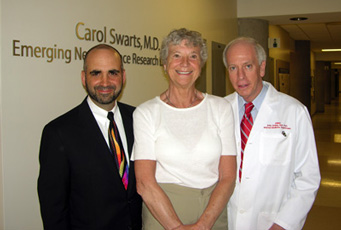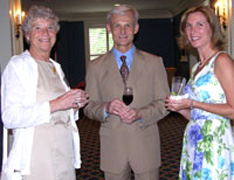 |
Carol Swarts, M.D., and Howard Gendelman, M.D., left, and John Gollan, M.D., Ph.D., right, outside the lab named in her honor. |
“The University of Nebraska gave me the chance to do what I’ve always wanted to do — be a doctor,” said the 1959 graduate of the UNMC College of Medicine — one of three women who graduated that year.
“Nebraska let me in at a time when girls were discouraged from becoming doctors and because of that I have gotten to spend my life doing what I love,” Dr. Swarts said.
As a result of this kindness, Dr. Swarts continues to support her alma mater. Recently she made a $500,000 commitment to the University of Nebraska Foundation that will fund research in the UNMC Department of Pharmacology and Experimental Neuroscience and support related-research endeavors that stretch from San Juan, Puerto Rico, to Nebraska to the Arctic Circle.
 |
Carol Swarts, M.D., left, and her niece, Jackie Swarts, with Bruce Ransom, M.D., Ph.D. |
Dr. Swarts, who was honored by the College of Medicine earlier this year as its Volunteer Faculty of the Year, said she believes it is a privilege and a responsibility to give back to society.
She’s also a big fan of Dr. Gendelman’s work on neurodegenerative disease.
“My father, his six siblings, several cousins, a brother and my husband had Alzheimer’s and I wanted to support research on preventing the degenerative process in the brain,” Dr. Swarts said. “Howie’s research ties in nicely with what I am interested in supporting.”
The unique thing about Dr. Gendelman and the other scientists in his lab is the teamwork, she said. Advanced technologies and many rich scientific and cultural backgrounds have merged to create a fantastic scientific environment and research team, she said.
“I also have seen this firsthand having journeyed with Howie and always felt engaged and excited about the great science, friendships and opportunities that have presented themselves,” Dr. Swarts said. “We all feel that the best is yet to come.”
On June 28, Dr. Swarts was honored for her commitment with a daytime lecture and dinner.
|
Irena Kadiu and Nathan Erdmann each received a plaque for outstanding achievement in graduate education. Kadiu works in the lab of Howard Gendelman, M.D., chairman of the Department of Experimental Neuroscience and Pharmacology. Erdmann works in the lab of Jialin Zheng, M.D., associate professor in the UNMC departments of pharmacology/experimental neuroscience and pathology/microbiology. “We are working with great effort to raise the bar in graduate education within our department,” Dr. Gendelman said. “Strides have been made and this bar has been reached through the outstanding research achievements of Irena and Nathan. We salute both for their contributions and for setting a standard for what can be achieved.” Kadiu’s work centers on the development of a new field for biomedical research called proteomics, which allows protein fingerprints to be uncovered from cells and body fluids. “Kadiu has played a substantive role in developing these techniques here at UNMC,” Dr. Gendelman said. “Her current works explores how proteins are produced, move in cell compartments and secreted to affect a variety of cell metabolic processes that are linked to function and neurological diseases.” Erdmann’s research is on the enzyme glutaminase and the hypothesis that glutamate is singularly responsive for nerve cell destruction in a variety of neurodegenerative disorders including HIV-1 associated dementia. “Nathan has studied the function of inhibitors designed to specifically block the activity of glutaminase and pathways responsible for its production,” Dr. Gendelman said. “The research explores new means for therapeutic developments for brain disease.” |
Dr. Ransom is the founding chairman of the department of neurology at the University of Washington School of Medicine and the founder and editor-in-chief of the journal “GLIA.”
The lecture was followed by the unveiling of the Carol Swarts, M.D., Emerging Neuroscience Research Laboratory in the Durham Research Center.
The Laboratory of Emerging Neuroscience Research will feature work on studies that wouldn’t normally be funded, but will lay the foundation for proof-of-concept ranging from brain regeneration to novel treatments and diagnostics for a number of different neurodegenerative disorders.One such study is being done in collaboration with Kelly Drew, Ph.D., from the University of Alaska, whose work focuses on hibernating mammals.
“It has been observed that hibernating mammals have neuroprotective capabilities during periods of extreme metabolic depression,” said Pawel Ciborowski, Ph.D., director of the proteomics program at UNMC.
Another study is to further the development of anti-retroviral drug delivery platforms for those who would benefit most. Yet another is to develop new ways to clear plaques in Alzheimer’s disease and affect immune responses that damage the brain as a consequence of injury, infection and degeneration.
Perhaps even more important is the opportunity for scientific exchange, travel and engaging new collaborations in disciplines not yet discovered.
“This support will open up doors where excitement and opportunity can hardly be contained,” Dr. Gendelman said. “It’s just so exciting!”